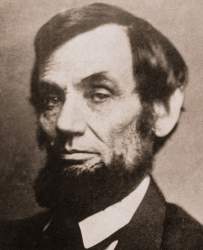Record Data
Original source
"The President's Speech--The Question of Reconstruction," New York Times, April 13, 1865, p.4.
Type
Newspaper
Date Certainty
Exact
Transcriber
John Osborne, Dickinson College
Transcription date
Transcription
The following text is presented here in complete form, as it originally appeared in print. Spelling and typographical errors have been preserved as in the original.
The President's Speech - The Question of Reconstruction.
Those who expected from the President the statement of a settled reconstruction policy have been disappointed. His speech disclosed nothing new on that subject. It was made up chiefly of remarks upon the inherent difficulties of the general task, and upon the considerations that prompted the attempt to restore Louisiana to its old status on the basis of twelve thousand loyal voters. No pledge was given, or intention declared, to hold to this or any other particular plan for the future. The special characteristic of the speech was its reserve.
Herein was wisdom. The time has not yet come for the establishment of any system of restoration. The simple reason is that one of the most important elements is yet to be developed. We mean the temper of the South. Upon this temper will depend the discretionary power that should be accorded. If the people lately in revolt choose to accept the result of the war like sensible men, if they exhibit a readiness to resume their relations to the Union in good faith, and to adapt themselves to the best of their ability to that free society which is indispensible to the national accord, every facility should be accorded then for their speedy repossession of every franchise and privilege existing under the constitution. But until time determines in what spirit the conciliatory spirit of the government will be met, it would be folly for the government to engage itself to any fixed line of action.
The Southern disposition hitherto manifested in the districts reduced to our control, is no test. So long as the Confederacy retained its capital and its great armies, almost every Southern mind was more or less under the delusion that it might still prevail, and was badly influenced. That delusion had now passed. The South now, for the first time, is in a condition to meet, with clear judgment, the question of its future relations to the Union. Some little time must be allowed the Government, too, to learn what concerrence and co-operation a liberal policy would be likely to receive. Every day now is rapidly shedding light upon these points, and we may confidently expect that the government will soon be prepared to move in the most advantageous direction.
The practical sense which President LINCOLN brings to this momentous work of reconstruction is forcibly illustrated in the remark of his speech that the question whether the so-called seceded States are or are not yet in the Union, is a "pernicious abstraction." A vast deal of controversy has been indulged in upon this subject, and sweeping conclusions have been drawn with a great deal of logical labor, from each hypothesis. The simnple fact is that categories and formulas in a practical business of this kind are but an impertinence. They are fit only for that Hudibrastic order of mind which must "tell the clock by algebra." Mr. LINCOLN spoke pat to the purpose when he said: "We all agree that the seceded States, so called, are out of their proper practical relation with the Union, and that the sole object of the government, civil and military, in regard to these States is again to get them into their proper practical relation." That covers the whole ground. Whether these States are out of the Union or not - though for our part very plain that they are not - it is needless to dispute.
Of course, these "proper practical relations" mean equal relations. The great end is to get every Southern State back, so that it shall perform the same obligations, and exercise the same rights, identically that are performed and exercised by every Northern State. It would be ruinous to our Constitutional system to pervert it so as to keep one section of the country permantly subordinate to the rest. Every friend of the Constitution must desire to have this exceptional condition of the South terminated as soon as possible. Nobody, we believe, wishes to keep any Southern State under disabilities, simply as a punishment. Mr. SUMNER himself, does not want to transform the Southern States into territories for any such object. The real concern here is, whether the Southern States, if restored at once to their full State rights, would not abuse them by an oppression of the black race. This race has rendered an assistance to the government in the time of danger that entitles them to its benign care. The government cannot, without the worst dishonor, permit the bondage of the black man to be continued in any form. It is bound by every moral principle, as well as by every prudential consideration, not to remit him to the tender mercies of any enemy. But it is to be hoped that the Southern people will inderstand that the interests of both races require a just relation between them, and that they will secure this by a prompt change of their State constitutions and laws. Every appearance, thus far, indicates such a disposition, and that in due time the government will be rid of this embarrassment. Yet for the present, further developments in respect to this and many other important matters must be awaited. The President must exercise caution, the people patience.



